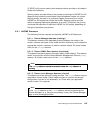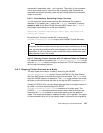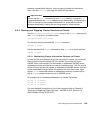
Cluster Management and Administration 155
(C-SPOC) utility can be used to start and stop cluster services on all nodes in
cluster environments.
Starting cluster services refers to the process of starting the HACMP for AIX
daemons that enable the coordination required between nodes in a cluster.
Starting cluster services on a node also triggers the execution of certain
HACMP for AIX scripts that initiate the cluster. Stopping cluster services
refers to stopping these same daemons on a node. This action may or may
not cause the execution of additional HACMP for AIX scripts, depending on
the type of shutdown you perform.
8.2.1 HACMP Daemons
The following lists the required and optional HACMP for AIX daemons.
8.2.1.1 Cluster Manager daemon (clstrmgr)
This daemon maintains the heartbeat protocol between the nodes in the
cluster, monitors the status of the nodes and their interfaces, and invokes the
appropriate scripts in response to node or network events. All cluster nodes
must run the
clstrmgr daemon.
8.2.1.2 Cluster SMUX Peer daemon (clsmuxpd)
This daemon maintains status information about cluster objects. This daemon
works in conjunction with the Simple Network Management Protocol (
snmpd)
daemon. All cluster nodes must run the
clsmuxpd daemon.
8.2.1.3 Cluster Lock Manager daemon (cllockd)
This daemon provides advisory locking services. The
cllockd daemon may be
required on cluster nodes if those nodes are part of a concurrent access
configuration, but this is not necessarily so. Check with your application
vendor to see if it is required.
The
clsmuxpd daemon cannot be started unless the snmpd daemon is
running.
Note
The clsmuxpd daemon cannot be started unless the snmpd daemon is
running.
If the
clsmuxpd daemon or the cllockd daemon cannot be started by the
Cluster Manager (e. g. the ports are already in use), the Cluster Manager
logs an error message and dies.
Note


















